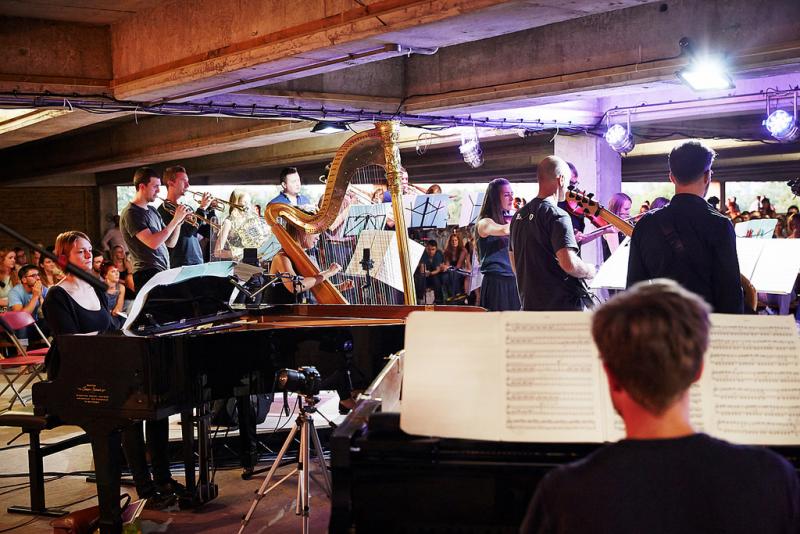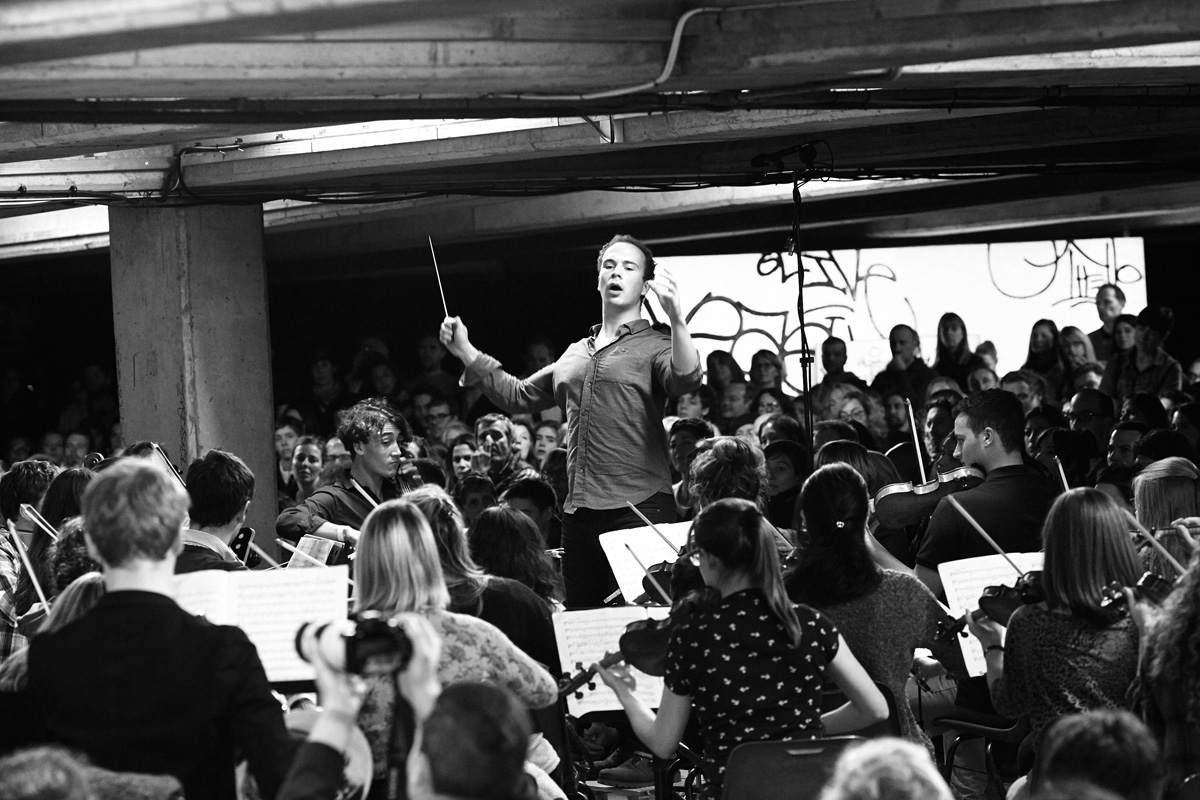Multi-Story Orchestra, Stark, Spitalfields Music Summer Festival | reviews, news & interviews
Multi-Story Orchestra, Stark, Spitalfields Music Summer Festival
Multi-Story Orchestra, Stark, Spitalfields Music Summer Festival
Relics brought to life in the Museum of Childhood

Crazy-faced space-hopper, playmobil fireman, marble run: toys from my own childhood, staring at me now from out of glass cases, alongside an 18th century marionette, thread-bare rocking horses and a headless Georgian doll. This concert in the Museum of Childhood could have been a wallow in nostalgia. Instead, with their usual brand of ingenuity, the Multi-Story Orchestra kindled musical artefacts into vibrant life.
It began with the trembling bow of Sally Pendlebury’s cello, open fifths sounding almost painfully vulnerable in the museum’s wide hangar. American composer Caroline Shaw’s In Manus Tuas explores "slices" of Thomas Tallis’s motet. It takes nerve to draw husky, dead whispers on an instrument designed to sing, but Pendlebury’s timorous opening made the flowering that followed all the more entrancing. Her own, quiet soprano joined plangent chord sequences, rising to rapid arpeggios beating with the airy ease of angels’ wings. After a tour de force of repetitions - New York underground meets Tudor chapel – Pendlebury came to rest on a simple G major broken chord, sweeping into harmonics – and silence.

Our next artefact was Bach’s Fuga, Ricercata in 6 voices from The Musical Offering, one of his extraordinary inventions that seems to exist in constant motion. Conductor Christopher Stark had arranged it for viola, bass clarinet, horn, cello, flute and violin, allowing for maximum contrast and maximum richness. It developed inexorably, but ultimately became too loud in this acoustic for individual lines to shine through.
When Gavin Bryars recorded the worship song of a homeless man for a documentary in 1971, he was interested in its potential as a musical loop. It was only when he left the tape playing in Leicester Polytechnic’s art department and found students weeping, that he recognised its emotive power.
Jesus Blood Never Failed Me Yet taps into a vein of English melancholy that stretches back to Dowland and beyond. Whoever this elderly man was (and he died without knowing his song had been transformed into a Minimalist classic) he was a fine singer, each pitch is true. The emotional hook lies in the momentary faltering of rhythm, a slight slip forward, on to which Bryars pours the balm of quiet strings, gradually weaving in a brass chorale, marimba, accordion, all underpinned here by Siret Lust’s elastic double bass-line.
Quite why this man’s meek assertion of faith in the face of failure, repeated over 40 minutes, should be so affecting is hard to fathom: the harmonies are comforting, almost banal, but, cleverly, not quite. In the end, the voice fades and all that is left is music, the clothes he stood up in. Magic.
rating
Explore topics
Share this article
The future of Arts Journalism
You can stop theartsdesk.com closing!
We urgently need financing to survive. Our fundraising drive has thus far raised £49,000 but we need to reach £100,000 or we will be forced to close. Please contribute here: https://gofund.me/c3f6033d
And if you can forward this information to anyone who might assist, we’d be grateful.

Subscribe to theartsdesk.com
Thank you for continuing to read our work on theartsdesk.com. For unlimited access to every article in its entirety, including our archive of more than 15,000 pieces, we're asking for £5 per month or £40 per year. We feel it's a very good deal, and hope you do too.
To take a subscription now simply click here.
And if you're looking for that extra gift for a friend or family member, why not treat them to a theartsdesk.com gift subscription?
more Classical music
 Kempf, Brno Philharmonic, Davies, Bridgewater Hall, Manchester review - European tradition meets American jazz
Bouncing Czechs enjoy their Gershwin and Brubeck alongside Janáček and Dvořák
Kempf, Brno Philharmonic, Davies, Bridgewater Hall, Manchester review - European tradition meets American jazz
Bouncing Czechs enjoy their Gershwin and Brubeck alongside Janáček and Dvořák
 Solomon, OAE, Butt, QEH review - daft Biblical whitewashing with great choruses
Even a top soprano and mezzo can’t make this Handel paean wholly convincing
Solomon, OAE, Butt, QEH review - daft Biblical whitewashing with great choruses
Even a top soprano and mezzo can’t make this Handel paean wholly convincing
 Two-Piano Gala, Kings Place review - shining constellations
London Piano Festival curators and illustrious friends entertain and enlighten
Two-Piano Gala, Kings Place review - shining constellations
London Piano Festival curators and illustrious friends entertain and enlighten
 Echo Vocal Ensemble, Latto, Union Chapel review - eclectic choral programme garlanded with dance
Beautiful singing at the heart of an imaginative and stylistically varied concert
Echo Vocal Ensemble, Latto, Union Chapel review - eclectic choral programme garlanded with dance
Beautiful singing at the heart of an imaginative and stylistically varied concert
 Scott, Irish Baroque Orchestra, Whelan, RIAM, Dublin review - towards a Mozart masterpiece
Characteristic joy and enlightenment from this team, but a valveless horn brings problems
Scott, Irish Baroque Orchestra, Whelan, RIAM, Dublin review - towards a Mozart masterpiece
Characteristic joy and enlightenment from this team, but a valveless horn brings problems
 Classical CDs: Voice flutes, flugelhorns and froth
Baroque sonatas, English orchestral music and an emotionally-charged vocal recital
Classical CDs: Voice flutes, flugelhorns and froth
Baroque sonatas, English orchestral music and an emotionally-charged vocal recital
 Kanneh-Mason, Britten Sinfonia, Shave, Milton Court - a grin and a big beaming smile
A pair of striking contemporary pieces alongside two old favourites
Kanneh-Mason, Britten Sinfonia, Shave, Milton Court - a grin and a big beaming smile
A pair of striking contemporary pieces alongside two old favourites
 theartsdesk at the New Ross Piano Festival - Finghin Collins’ musical rainbow
From revelatory Bach played with astounding maturity by a 22 year old to four-hand jazz
theartsdesk at the New Ross Piano Festival - Finghin Collins’ musical rainbow
From revelatory Bach played with astounding maturity by a 22 year old to four-hand jazz
 First Person: Manchester Camerata's Head of Artistic Planning Clara Marshall Cawley on questioning the status quo
Five days of free events with all sorts of audiences around Manchester starts tomorrow
First Person: Manchester Camerata's Head of Artistic Planning Clara Marshall Cawley on questioning the status quo
Five days of free events with all sorts of audiences around Manchester starts tomorrow
 Goldscheider, Brother Tree Sound, Kings Place review - music of hope from a young composer
Unusual combination of horn, strings and electronics makes for some intriguing listening
Goldscheider, Brother Tree Sound, Kings Place review - music of hope from a young composer
Unusual combination of horn, strings and electronics makes for some intriguing listening

Add comment